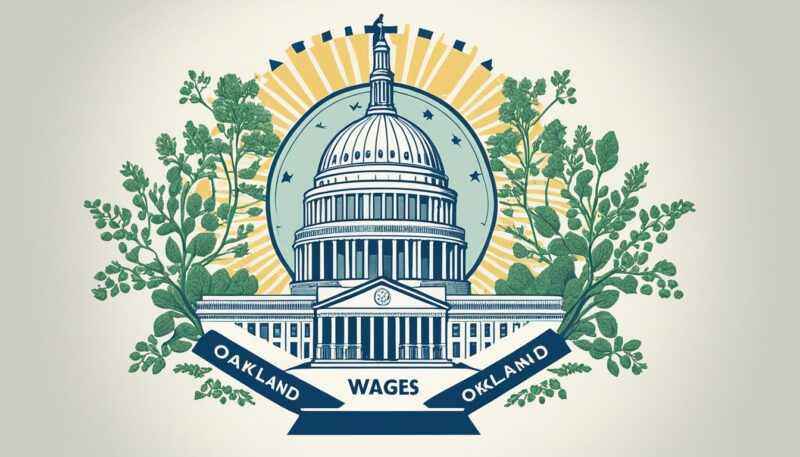The City of Oakland is on the threshold of a significant transformation concerning its wages structure, with the approaching Oakland Minimum Wage 2024 adjustment poised to make an influential impact on the local economy and its workforce. This upcoming change is not merely a numerical revision but a pivotal move geared to redefine the standards of living and employment practices within this vibrant Californian community. The revision of the 2024 minimum wage Oakland employers must adhere to will require thoughtful navigation through the nuanced Oakland employment regulations as they continue to evolve.
Key Takeaways
- Understanding the forthcoming changes to the Oakland Minimum Wage 2024 is critical for employees and employers alike.
- Local businesses are urged to align with the increasing wage standards to ensure compliance with Oakland employment regulations.
- The increase reflects the city’s commitment to addressing the cost of living and economic challenges facing the workforce.
- This wage adjustment signifies an essential step towards improving the social fabric and fiscal health of Oakland’s community.
- Educating all stakeholders about these changes is vital to foster a smooth transition when the new regulations take effect.
Understanding the Oakland Minimum Wage 2024 Increase
As Oakland prepares for another significant milestone in its labor laws, the increase of the city minimum wage in 2024 marks a pivotal moment for its economy. While this change reflects broader trends within the Bay Area and across the nation, the specific context of Oakland’s economic landscape provides a distinct narrative of worker empowerment and business adaptation. This section delves into the evolution of Oakland’s minimum wage, the multifaceted influences upon the forthcoming increase, and the projected economic repercussions for both the city’s workforce and its business community.
History of Minimum Wage Adjustments in Oakland
Tracing the trajectory of the Oakland city minimum wage reveals a history of progressive adjustments aimed at improving living standards for workers. Despite initial opposition, incremental raises in minimum wage rates have gained support through the efforts of labor advocates and policy makers. This context is essential for appreciating the underlying philosophy driving the 2024 wage policy shift.
Key Factors Influencing the 2024 Wage Change
Several critical elements are at play influencing the imminent Oakland wage increase. These encompass cost of living adjustments reflective of the region’s economic climate, the pinch of inflation on everyday goods and services, and relentless advocacy from labor unions and workers’ rights groups who herald the spike in wages as a necessity for economic equity.
Economic Impact on Local Businesses and Workers
The upcoming wage enhancement carries mixed implications for Oakland’s economic sectors. While businesses grapple with the challenge of wage restructuring, workers anticipate a rise in disposable income, potentially stimulating local commerce. Detailed analyses from economic reports project a complex tableau of regional economic recalibration in response to the wage changes.
| Year | Minimum Wage | Percent Increase |
|---|---|---|
| 2022 | $14.36 | 3.8% |
| 2023 | $15.06 | 4.9% |
| 2024 | To Be Determined | Expected Increase* |
*The exact percentage increase for the 2024 Oakland city minimum wage will be determined based on cost of living adjustments and inflation rates.
The Legal Framework Surrounding Oakland Wage Increase
As Oakland prepares for the wage increase slated for 2024, a robust legal framework supports and governs this pivotal change. Central to this structure is the City Council’s ordinance, an instrumental document that articulates the specifics of the wage adjustments under Oakland labor laws. The ordinance not only declares the imminent rise in minimum wage but also stipulates the enforcement mechanisms to ensure compliance from all local businesses.
The local government plays an essential role in the enforcement of these Oakland employment regulations. By collaborating with various legislative bodies and agencies, they help foster a fair working environment that aligns with both the state of California’s standards and federal guidelines. These alliances are crucial in ensuring that the transition to the new wage requirements is both smooth and equitable for all involved parties.
It is important to highlight how Oakland’s wage increase reflects a broader commitment to workers’ rights at the state and federal levels. By integrating local regulations with more extensive protections, Oakland reinforces its stance on labor equality and economic growth. Government publications and legal databases provide the backbone of knowledge that supports these legislative measures, giving both employers and workers access to clear, actionable information.
Citing an official statement from the Oakland City Council, “The upcoming wage increase is a testament to our city’s dedication to ensuring a living wage that resonates with the cost of living and economic realities facing our workforce today.”
By understanding the legal framework surrounding the Oakland wage increase, both employers and employees can prepare for the changes ahead. Knowledge of Oakland labor laws, when coupled with proactive measures taken by the local authorities, guarantees fair practice and drives the collective economic prosperity of the city.

Oakland Labor Laws and Employment Regulations
As Oakland embarks on significant changes with the wage increase, understanding the intricacies of local labor laws and employment regulations becomes paramount. This section dives into the nuances of Oakland’s legal landscape, examining how the impending wage adjustments intertwine with workers’ rights and employer responsibilities.
Workers’ Rights in Oakland: What You Need to Know
In Oakland, labor laws serve as the foundation for safeguarding workers’ rights, ensuring fair treatment in the workplace. These rights span various aspects of employment, from wage and hour regulations to safety standards and anti-discrimination policies. With the Oakland wage increase on the horizon, employees are poised to experience changes in their financial earnings and legal protections.
Employer Obligations Under New Wage Standards
Employers in Oakland will need to navigate the complexities of adhering to the new wage standards. Compliance involves not just updating payroll systems, but also a comprehensive understanding of the legal obligations, including overtime calculations, benefits adjustments, and maintaining proper records. Non-compliance can lead to significant penalties, making it crucial for businesses to seek guidance and, if necessary, legal counsel.
Comparative Analysis with Federal and State Employment Laws
Oakland employment regulations operate within a matrix of federal and state labor laws. This comparative analysis seeks to delineate how Oakland labor laws align with or diverge from broader legislative frameworks. Employers and employees must recognize the interplay between these layers of governance, as it affects compliance and enforcement at all levels.
| Aspect | Oakland | California State | Federal |
|---|---|---|---|
| Minimum Wage | Oakland wage increase to $X.XX/hour | $X.XX/hour (statewide) | $X.XX/hour (federal minimum) |
| Overtime Pay | 1.5x hourly rate after 40 hours/week | 1.5x hourly rate after 8 hours/day | 1.5x hourly rate after 40 hours/week |
| Paid Leave | Varies by employer policy | Minimum requirements per CA law | No federal mandate for paid leave |
| Anti-Discrimination | Robust local protections | Extensive state-level protections | Based on federal civil rights law |
Living Wage in Oakland: Beyond the Minimum
The term “Oakland living wage” signifies the continual efforts to ensure a standard of living that rises above mere subsistence, differing significantly from the statutory Oakland minimum wage increase. A living wage takes into account the realistic costs of housing, food, healthcare, education, transportation, and other necessities that are essential for a worker and their family to live a secure and dignified life within Oakland’s dynamic economy.
Oakland’s policymakers, local activists, and labor organizations are at the forefront of the debate, advocating for wages that not only meet legal standards but offer a sustainable and fair income for all workers. This movement promotes an economic environment where work not only compensates fairly but also enhances the quality of life for Oakland’s diverse communities. Meanwhile, businesses grapple with the implications of such adjustments on their operations and competitive position in the market.
Key to the conversation is the difference between the current minimum wage and the proposed living wage. While a minimum wage sets the floor, the living wage aspires to meet the ceiling of what is deemed a reasonable living standard in one of the most expensive regions of the United States. The pursuit of a living wage in Oakland reflects a growing recognition of the disparities between wages and the actual costs of living.
- The Oakland minimum wage increase is a legal mandate that adjusts the baseline wage for all workers.
- The living wage, meanwhile, is a voluntary or policy-driven rate that businesses may adopt to reflect the true costs of living in a specific region.
A comparative analysis can further illuminate the gap:
| Comparison Metrics | Minimum Wage | Living Wage |
|---|---|---|
| Scope | Legally enforced minimum | Recommended standard based on living costs |
| Wage Basis | Standardized state or federal rates | Regional cost of living calculations |
| Impact on Workers | Guarantees minimum income | Targets improved quality of life |
| Impact on Businesses | Increases operational costs | May enhance staff retention and morale |
As Oakland faces rising living expenses, aligning the minimum wage with a living wage could well become a cornerstone for economic and social policy in the city. A comprehensive exploration of pathways to achieve this alignment is essential. It must encompass robust dialogues with community stakeholders, collaborative input from economic experts, and a commitment to the well-being of every resident in ensuring a balanced, thriving Oakland.
Conclusion
As we approach the pivotal year of 2024, both employees and employers within the vibrant city of Oakland stand on the cusp of a significant economic shift. The increase in the minimum wage is more than a change in legislation; it represents a transformative movement within the Oakland labor laws, set to recalibrate the dynamics of the local job market. Navigating this adjustment will necessitate strategic preparation and an adherence to the newly set Oakland city minimum wage standards. Employees will need to understand their rights and entitlements under this change, while employers must familiarize themselves with the ensuing responsibilities to ensure compliance and harness the potential benefits.
Prepare for the Future: Navigating the 2024 Minimum Wage Increase
Indubitably, intricate planning and adaptation are essential for both parties. Employers will need to strategically revise payroll structures and budget allocations to accommodate the 2024 minimum wage Oakland mandates. Concurrently, employees should acclimatize to the updated financial outlook and leverage the opportunities that come with increased wages. It’s crucial that all stakeholders engage with the resources available and consider the impact of these changes on their daily operations and livelihoods.
Social and Economic Benefits of Increased Wages in Oakland
The ripple effects of the Oakland city minimum wage increase are forecasted to extend well beyond the individual paychecks. Anticipated social benefits include a potential reduction in poverty rates and an elevation in the standard of living for those at the lower end of the income spectrum. Furthermore, economic benefits may manifest in the form of augmented consumer spending power, which could invigorate local businesses. A stable, fairly compensated workforce might also translate into reduced staff turnover rates, cultivating a more loyal and productive work environment. With these possibilities in mind, it becomes imperative for the Oakland community to continue the dialogue on wage policies and maintain a commitment to educating themselves on the socioeconomic intricacies impacted by the minimum wage increase.
As the narrative of labor adjustments unfolds, it is incumbent upon us to remain vigilant and proactive. The alteration to the 2024 minimum wage Oakland will undeniably have profound effects, but, with astute planning and continuous learning, the city of Oakland can set a precedent for positive change in employment regulations. Employees and employers alike are encouraged to look ahead with optimism and an unwavering resolve to make the most of the opportunities that lay before them in this evolving economic landscape.
